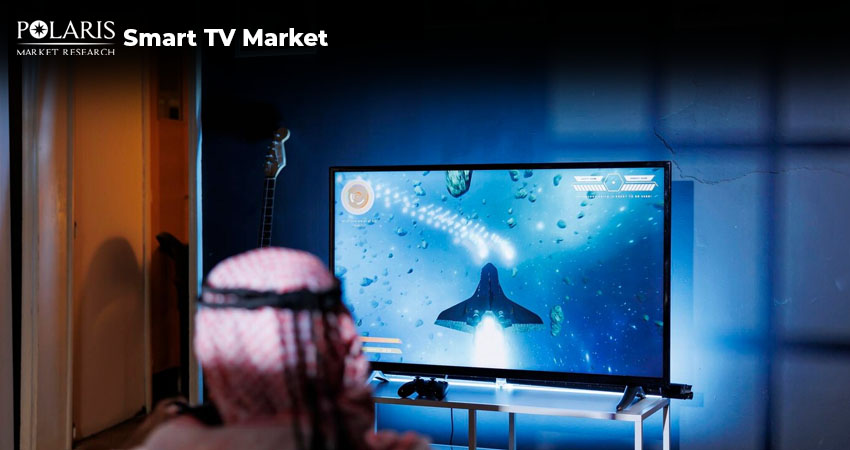Listing High-Impact Companies Driving Transformation in Smart TV Market in 2025

The emergence of smart TVs has revolutionized the way we experience entertainment, blending traditional television with internet connectivity and smart features. With streaming services, voice control, and integrated apps, Smart TVs are now a central hub for multimedia consumption. As consumer demand for seamless connectivity and enhanced viewing experiences grows, companies are pushing the boundaries of technology to deliver innovative Smart TVs.
Curious why smart TVs are gaining increased traction among consumers worldwide? In this blog, we will explore the basics of Smart TVs and their standout features. Also, we will shed light on the key market trends and the companies leading this rapidly evolving market.
What Is Smart TV?
A smart TV is a television equipped with an operating system (OS) that allows internet connectivity and access to a range of apps and features, similar to smartphones. Unlike conventional TVs, Smart TVs enable users to:
- Stream content from platforms like Netflix, Amazon Prime, and YouTube.
- Browse the internet and access social media.
- Use voice assistants like Alexa, Google Assistant, and Bixby for hands-free operation.
- Connect with other smart devices for an integrated home ecosystem.
Smart TVs essentially combine the best of traditional television with advanced digital capabilities, creating an immersive viewing experience.
Top Companies Manufacturing Smart TVs
Established in 1969, Samsung Electronics Co., Ltd. is a multinational corporation specializing in consumer electronics and appliances, with its headquarters located in Suwon, South Korea's Yeongtong District. Samsung is a dominant player in the Smart TV market, with a variety of models featuring QLED and Neo QLED technologies. Their Tizen OS ensures a seamless user experience, while Smart Hub and Bixby provide intelligent controls. Samsung's 8K TVs are at the cutting edge of display innovation.
- LG Electronics
Headquartered in Yeouido-dong, Seoul, South Korea, LG Electronics Inc. is a multinational corporation that specializes in consumer electronics and appliances. LG is known for its OLED technology, which provides unrivaled contrast and black levels. Its webOS platform is user-friendly, with voice control enabled by Google Assistant and Amazon Alexa. LG has also included NVIDIA G-Sync for gaming enthusiasts.
- Sony Corporations
Founded in 1946, Sony Group Corporation is a multinational conglomerate headquartered in Minato, Tokyo, Japan. Sony's Smart TVs are notable for their picture quality and acoustic performance. The BRAVIA XR Cognitive Processor improves clarity, color, and contrast, while the Google TV interface simplifies navigation. Sony's OLED and LED TVs use Dolby Vision and Dolby Atmos to create cinematic visuals.
The headquarters of the Panasonic Holdings Corporation is located in Kadoma, Osaka, Japan. Panasonic specializes in OLED Smart TVs that offer cinematic picture quality with HDR10+ and Dolby Vision support. Their My Home Screen OS provides easy navigation, making it a popular choice for home theaters.
- Xiaomi (Mi)
Founded in 2010 and headquartered in Beijing, China, Xiaomi Corporation is a Chinese company that designs and manufactures consumer electronics and related software, home appliances, cars, and household hardware. Xiaomi, a well-known player in the affordable Smart TV market, offers both value and advanced features. Their Android TVs, which support Google Assistant, Chromecast, and 4K displays, are popular in emerging markets.
Key Features of Smart TVs
Smart TV offers a range of features that redefine the experience of enjoying watching television. They are mentioned below:
- Smart Platforms and Apps
Smart TVs are preloaded with streaming services like Netflix, Hulu, Disney+, and Prime Video. They also support app stores for downloading additional apps in categories such as entertainment, fitness, gaming, and more.
- Voice Control and AI Integration
Modern smart TVs include AI-powered voice assistants such as Amazon Alexa, Google Assistant, and Samsung's Bixby. Voice commands enable users to switch channels, adjust volume, search for content, and control smart home devices.
- 4K and 8K Resolution
Ultra HD (4K) and 8K Smart TVs provide stunning image quality, with sharper details and vibrant colors. These TVs, when combined with HDR (High Dynamic Range) technology, provide superior contrast and brightness for a more lifelike viewing experience.
- Smart Connectivity
Smart TVs include Bluetooth, Wi-Fi, and screen mirroring capabilities, allowing for seamless connectivity with smartphones, laptops, and other devices. Apple AirPlay and Google Chromecast allow users to stream content directly from their devices.
- Home Ecosystems Integrations
Smart TVs act as the control hub for smart home ecosystems. Users can control lights, cameras, thermostats, and other Internet of Things (IoT) devices directly from their televisions.
- Gaming Capabilities
Smart TVs are now an excellent choice for both casual and competitive gamers, thanks to built-in gaming modes, low input lag, and cloud gaming services such as NVIDIA GeForce NOW and Xbox Game Pass.
- Energy Efficiency
With advanced technologies like OLED and QLED, Smart TVs are becoming more energy-efficient while offering superior performance. Also, smart TVs can stream entertainment directly to the TV, eliminating the need for cable boxes, media streamers, and gaming consoles, which all consume electricity.
Future of Smart TVs
The Smart TV industry is set to witness groundbreaking advancements in the coming years, some of which are as follows:
- Artificial Intelligence (AI) and Machine Learning Integration
AI-powered content recommendations, voice assistants, and automated image adjustments are expected to all improve personalization.
- 8K and Beyond
As display technologies advance, 8K resolution TVs will likely become popular, providing an unparalleled viewing experience.
- Augmented and Virtual Reality
Future Smart TVs may integrate AR/VR technologies, transforming the way users interact with entertainment content over televisions.
- Sustainability
To meet global sustainability targets, manufacturers are expected to prioritize energy-efficient and environmentally friendly technologies.
Conclusion
Smart TVs have revolutionized entertainment by combining high-resolution displays, streaming capabilities, and smart home integration. Companies like Samsung, LG, Sony, TCL, and Xiaomi are setting the standard for innovative features and competitive pricing, catering to both premium and budget segments. As technologies such as AI, 5G, and cloud gaming advance, smart TVs will evolve to provide unparalleled convenience and immersive experiences.

